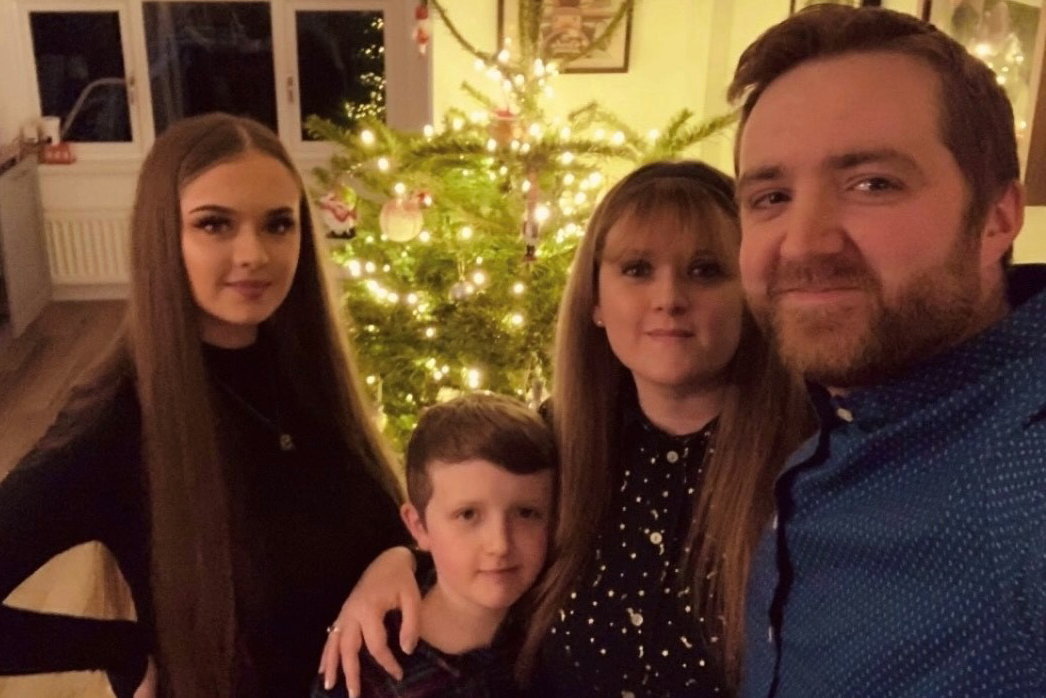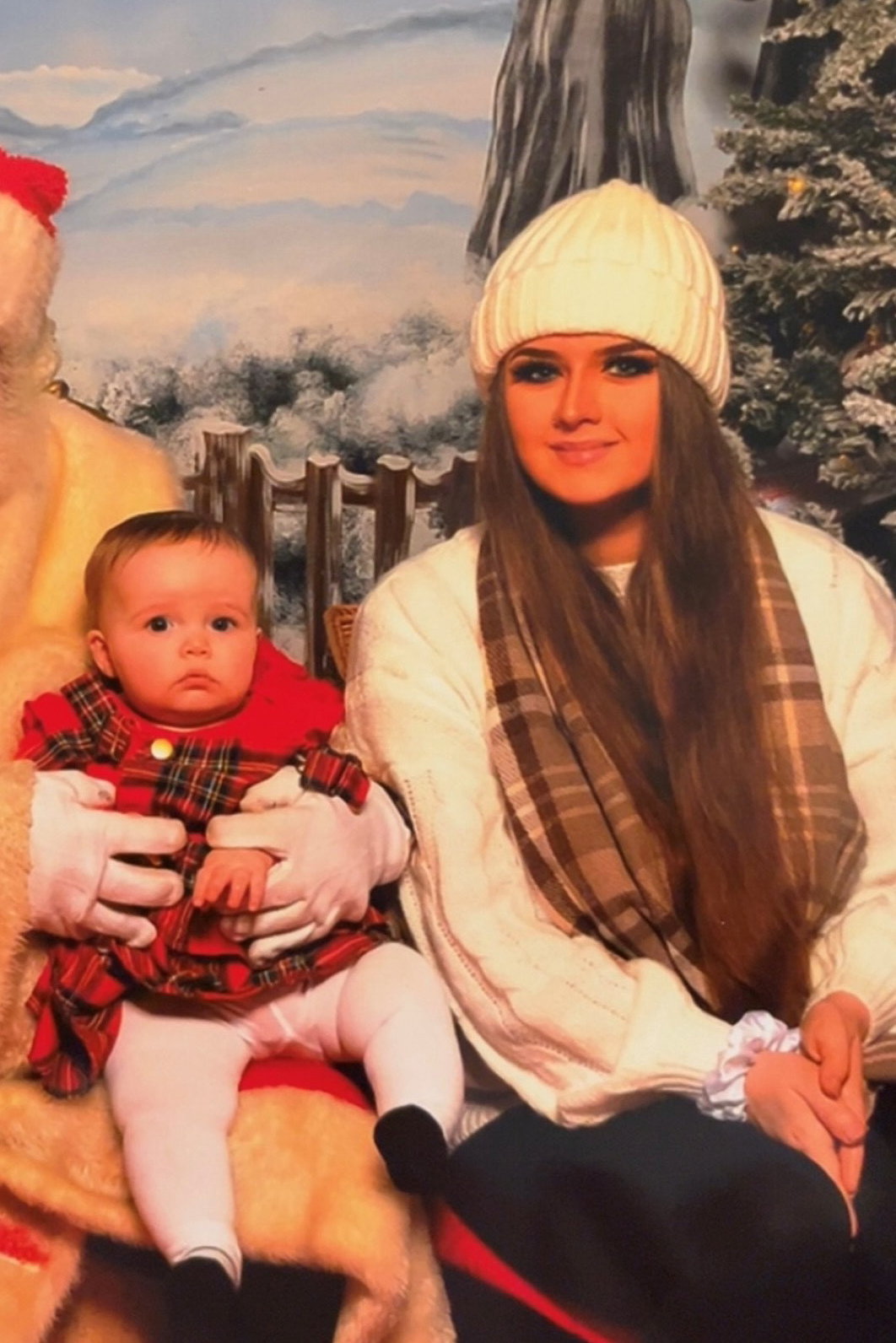A YOUNG mum has just months to live after discovering the true cause of her “dry eyes”.
Rachael Burns, 22, thought she was suffering from the common condition after welcoming her first child, daughter Raeya.
The new mum noticed a difference in her eyesight and migraines she had previously suffered with became worse in March 2023.
They were so bad Rachael was confined to her bed for days at a time.
However, when she went to an optician they told her she simply had “dry eye”, for which she was prescribed eyedrops.
“I was sent home with eyedrops and glasses which just made me feel dizzier,” she said.
“My eyesight worsened, leading to me walk in front of cars due to the blind spot on my right side.
“I could no longer take my daughter out of the house on my own as I was so worried I would put her in danger.”
Despite her worsening condition, the young mum was hesitant to seek help because she feared she “was being dramatic”.
But, Rachael was rushed to hospital when one migraine stuck her so intensely she couldn’t open one eye – and her face began to droop on one side.
Royal Victoria Hospital conducted an MRI scan, which identified the tragic cause of the young mum’s problems.
The 22-year-old was diagnosed with a cancerous tumour called diffuse midline glioma (DIPG).
It had already heartbreakingly spread to her spine and she was given the shattering prognoses.
Rachael was told she has just months to live and her devastated family have launched a GoFundMe for life-extending treatment.
The mum-of-one, from Belfast, Northern Ireland, said: “When I was told I had a brain tumour my entire world fell apart.
“I was told that the life expectancy of someone with my diagnosis was 12 months, and I had already been showing symptoms for eight.
“I just didn’t expect to receive news that awful. I’d hoped to maybe have at least a year or two. This hugely affected me mentally. I just sort of crumbled.”
Rachael was diagnosed in May 202, nearly a year after noticing her symptoms.
DIPG symptoms
The most common DIPG symptoms may include:
- problems with walking, coordination or balance
- weakness in the arms and legs
- difficulty controlling facial expressions or one side of the face appearing different from the other
- speech difficulties
- problems with swallowing and chewing
- double vision or difficulty controlling eye movement.
Growth of the tumour might also block the drainage of the cerebrospinal fluid that surrounds and nourishes the brain. This can cause a build-up of pressure in the head, known as hydrocephalus, and can cause:
- headaches (especially in the morning)
- nausea
- fatigue.
Doctors said surgery was not an option because the tumour was on her brainstem.
Her desperate and heartbroken family are now raising funds for life-extending treatment called ONC201 drug.
She is now going through six weeks of gruelling radiation treatment, with 30 sessions on her brain and 28 sessions on her spinal cord.
Rachael said: “Some days I’ll wake up and my legs won’t work, and I’ll be crying in agony for hours at a time with the pain.
“My partner Robert has had to take over most of our daughter’s care and it makes me feel so useless, like I’m already being stripped of a lot of my motherhood.
“Some days I can walk unassisted and I’m able to lift Raeya. All I can do is hope that I get as many good days like that as possible because memories with my family are all that matter to me now.
“I’ve researched a lot of other young people with my diagnosis who say radiation just didn’t work at shrinking their tumour at all, so we as a family set out to find any possible trials or drugs that might give me a chance.”
Rachael and her family are now in the process of fundraising to pay for potentially life-extending treatment.
The ONC201 drug is administered privately in Germany and has prolonged patients’ lives by almost two years in previous cases.
Rachael’s family need to raise £150,000 in order to cover travel costs, private scans, and the medication itself among a litany of expenses.
I just didn’t expect to receive news that awful. I’d hoped to maybe have at least a year or two. This hugely affected me mentally. I just sort of crumbled
Rachael
“As hard as it is to ask for help, I’m really swallowing my pride and letting myself be vulnerable enough to beg for this extra time,” said Rachael.
“I am not ready to leave my family and my baby.
“One year is not anywhere near enough time to get to experience the gift of motherhood and have it stripped from you. I’ll never see Raeya walk down the aisle and for what? Just bad luck? It isn’t fair.
“I may not get to take her to her first day of school but any extra days with her will be a blessing so I will fight with everything in me to wake up to her each morning.”
Rachael is also battling to raise awareness and funding into brain tumour research.
Louise Aubrey, community development manager at Brain Tumour Research, said: “It’s a tragedy that a young mother like Rachael cannot get the best drugs and treatment in the UK, and instead has to spend hundreds of thousands for the chance to spend more time with her daughter.
“Brain tumours kill more children and adults under the age of 40 than any other cancer, yet just 1% of the national spend on cancer research has been allocated to brain tumours since records began in 2002.
“This is unacceptable. So much more needs to be done to prevent young families like Rachael’s from being ripped apart by this devastating disease.”
What is DIPG, or diffuse midline glioma?
Diffuse midline gliomas are grade 4 brain tumours that, until recently, were called diffuse intrinsic pontine gliomas (DIPGs).
They’re more common in children, but they can occur in adults. They’re:
- fast growing
- likely to spread
- sometimes referred to as malignant or cancerous
- difficult to remove surgically because they are diffuse, which means they don’t have well-defined borders
- a type of glioma, which is a brain tumour that grows from a glial cell.
Diffuse midline gliomas grow in the areas of the brain that are found in the midline, this is the natural centre line of the brain between its two halves.
They most commonly grow in the pons in region of the brain stem, the thalamus and the spinal cord.





